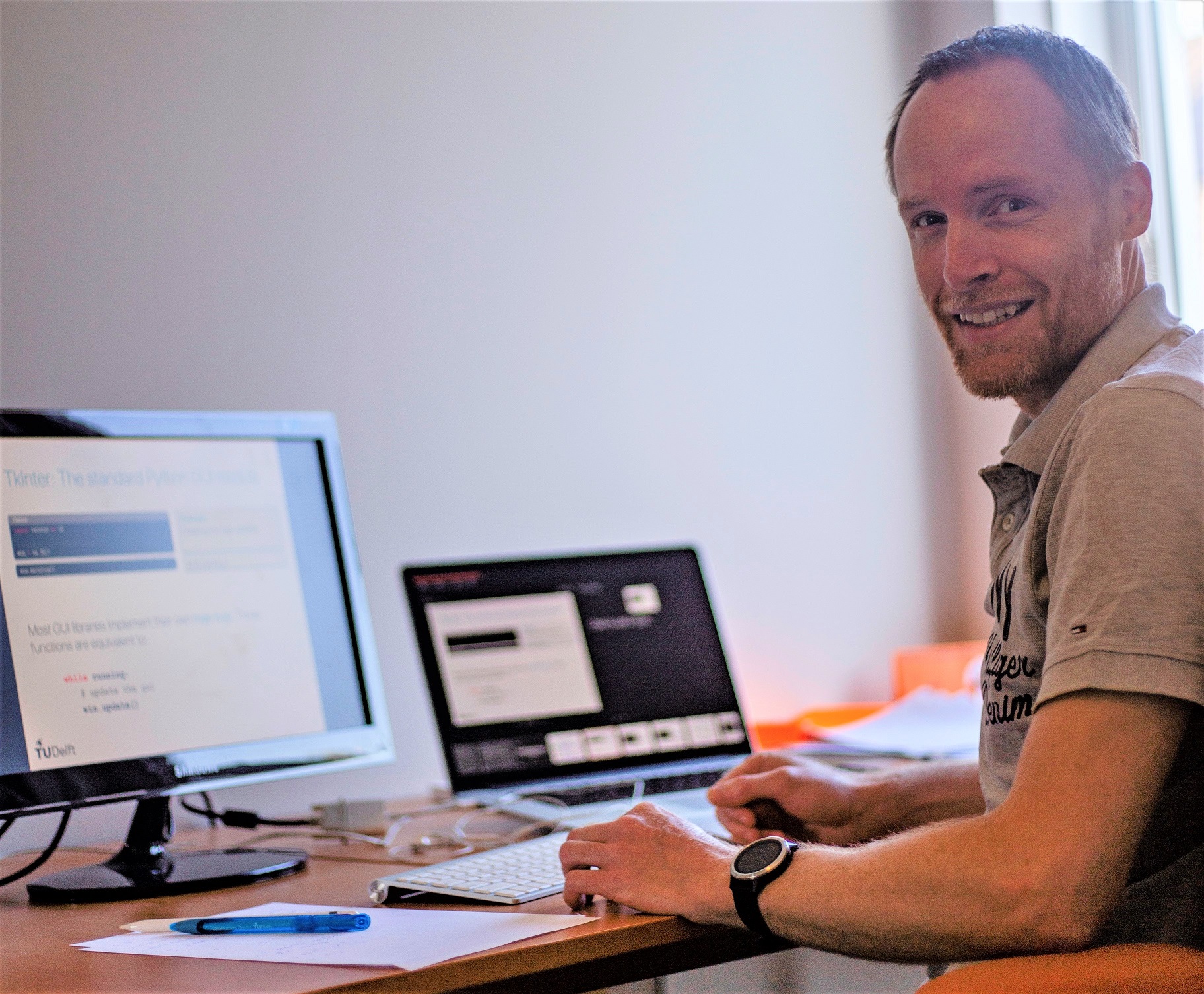How do you turn a large first year lecture into an online success? Aerospace Engineering teachers Joost Ellerbroek and Guido de Croon thought up an answer.
Joost Ellebroek taught 500 first year aerospace engineering students via social gaming platform Discord. (Photo: Joost Ellerbroek)
Ellerbroek and De Croon won’t easily forget the first year that they gave the subject Programming and Scientific Computing in Python (AE1205). The outbreak of the coronavirus forced them to organise the Aerospace Engineering, taken by 500 students, online.
It soon transpired that the resources set aside by TU Delft were not enough. “We didn’t know and hit a brick wall,” says Ellerbroek. “Only 200 students could take the first lecture. The platforms available at TU Delft – Bongo YouSeeU and Cisco WebEx – have a limited capacity.” Within two days, the two teachers, helped by 16 student assistants, were looking for alternatives. “The alternative was YouTube. Endless numbers of people could watch at the same time and it is very accessible. You could set up a live stream within no time and the videos are still available afterwards.”
Discord
The subject, which is divided into two groups of 250 students, is largely interactive. “You learn programming by doing it. During the lessons, the students work on practical examples and the teachers are there for explanation.” But how do you do this online?
“I heard about Discord from a colleague. Before the coronavirus this platform was mostly used by online gamers and it is an excellent way for large groups of users to communicate. We set up two servers via the platform, one for each group. The servers have various ‘channels’ for things like questions, assignments and announcements. But the best thing about Discord is that you can programme bots in Python, the language that the students learn during their course.”
‘At a certain point there were 150 students in the queue’
By bots, Ellerbroek means a sort of virtual user that listens and responds to commands that human users give. “Students can do, for example, extra assignments and gain a half bonus point. To check if they understood the code they submitted, we ask for a brief explanation in a conversation. The students can sign up for this by telling the bot that they are ready to discuss their work. The bot then places the student in the queue. As soon as a teacher is available, the next person in the queue is connected to the teacher through another screen. Students love it as there were 150 of them in the queue at a certain point.”
Dropout
Checking the assignments of 500 students? That can’t be easy. Still, Ellerbroek says that it’s doable. “We work with a large team and you see pretty quickly if a student understands the material or not.” The teachers are just as strict in this period as before. “But if we see that students have done their best, we will give them a couple of tips to improve their work and pass the assignment. This helps motivate them. The clue to this subject is to do it. Programming involves plenty of practice.”
But it is hard for Ellerbroek to not see his students. “We can’t see the group of students that find programming tough. In a lecture hall you’re constantly walking around and you look at their screens with them. You immediately see if a student can’t get any further than opening Facebook.” Despite this, he still predicts a minimum number of dropouts. “In the end, 70% of the students submitted all the required assignments for a bonus point. That is a very hopeful sign.”
Different time zones
The subject is divided into 14 lessons of four hours. Quite long, especially now that students have to learn online. “The VSV Leonardo Da Vinci study association also pointed this out during its feedback round. Students have motivation issues. This is the reason that we consciously chose live lectures. This gives students a certain structure.”
The regular times were a major challenge for some students. “A handful of students who took the subject were in different time zones. We tried to help them by doing things like easing the deadlines. I was also working on the subject so much that I was online almost all the time. I could then help them outside the planned times.”
Feedback
If Ellerbroek is able to stand in front of the class again next year, he hopes that he will still use some of the online tools. “I would like to keep the queue in Discord. When it’s your turn you get a notice to go the available teacher’s table, for example.”
While Discord is not officially approved by TU Delft for privacy reasons, Ellerbroek mostly receives positive responses. “Students see it as a sort of community and the study association called this subject ‘the best organised of the fourth quarter’ because of Discord. But the best compliment came from a colleague. “He told me that his students suggested that he see how the teachers in the Python course were working.”
‘Online teaching has its charms’
In response, Ellerbroek worked on a set of instructions for his Aerospace Engineering colleagues. Looking back, is he proud of what was organised in a short space of time? “It took a lot of energy, but online teaching has its charms.”
Do you have a question or comment about this article?
m.vanderveldt@tudelft.nl


Comments are closed.